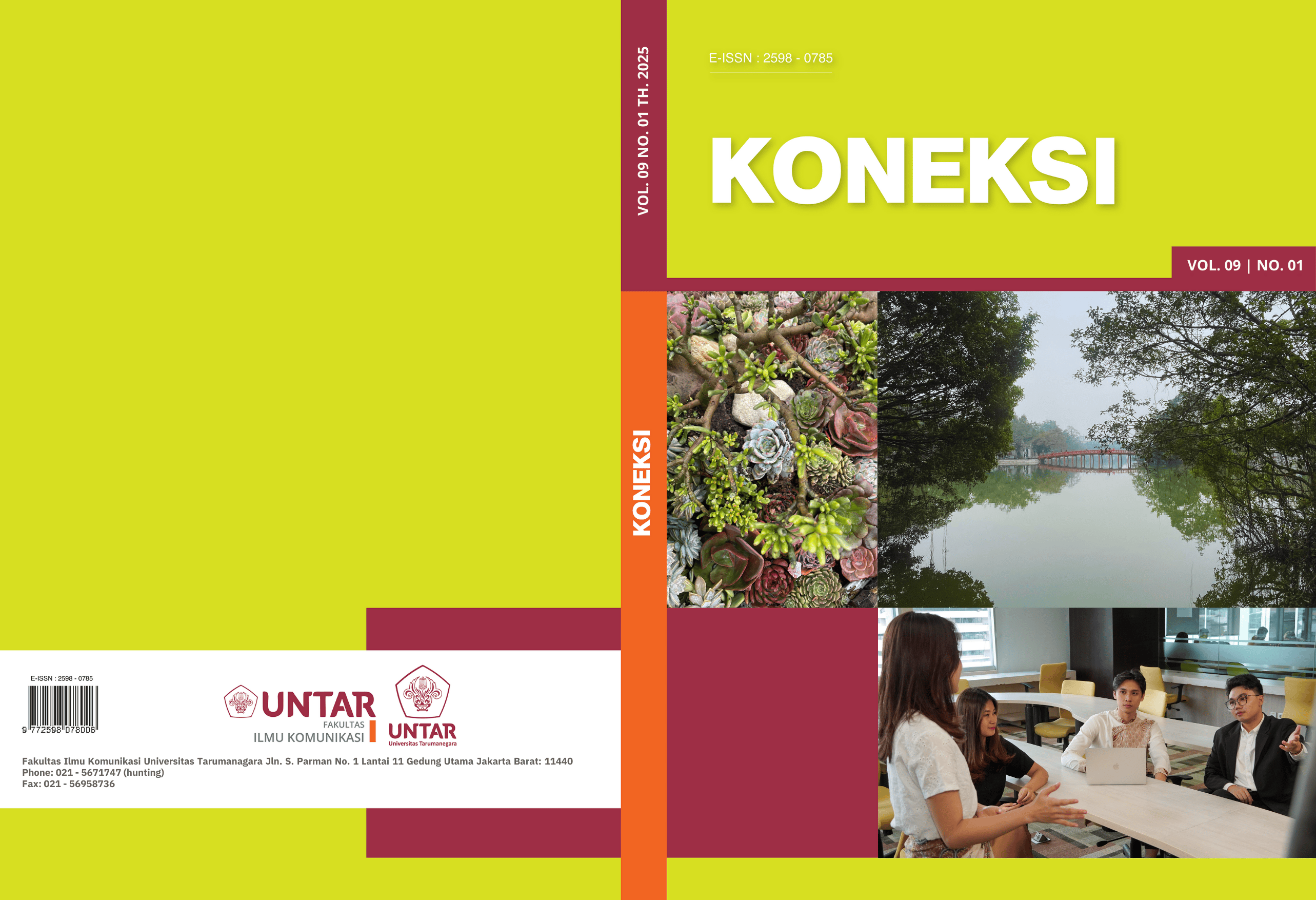Komunikasi Interpersonal: Memotivasi Kinerja Pemain pada Tim Alter Ego Esports
Main Article Content
Abstract
This study aims to explain the interpersonal communication patterns between coaches and athletes in the Alter Ego esports team in the context of athlete performance motivation. This research uses a qualitative approach with a case study method. The data collection techniques applied were in-depth interviews, non-participant observation, and documentation. The analysis technique used was proposed by Neuman (2014) and consists of three stages, namely Conceptualisation, Coding Qualitative Data, and Outcroppings. The results showed that there was communication between instructors and members, starting from the introduction stage of each character or person. As a result, communication between personal coaches and esports players can motivate players in the team to continue to be enthusiastic. Important elements include communication through specialised groups on messaging platforms and regular meetings. The findings also show that coaches act as leaders who can understand the psychological and emotional aspects of players. Openness in interpersonal communication creates space for players to share their feelings and needs, which in turn, can build trusting relationships.
Penelitian ini bertujuan untuk menjelaskan pola komunikasi interpersonal antara pelatih dan atlet dalam tim esports Alter Ego dalam konteks motivasi kinerja atlet. Penelitian ini menggunakan pendekatan kualitatif dengan metode studi kasus. Teknik pengumpulan data yang diterapkan yaitu wawancara mendalam, observasi non-partisipan, dan dokumentasi. Teknik analisis yang digunakan dikemukakan oleh Neuman (2014), terdiri dari tiga tahap yaitu Conceptualization, Coding Qualitative Data, dan Outcroppings. Hasil penelitian menunjukkan bahwa terjalin komunikasi antara instruktur dengan anggota, diawali dari tahap pengenalan dari karakter atau pribadi masing-masing. Hasilnya, komunikasi antar pribadi pelatih dan pemain esports bisa memotivasi pemain dalam tim untuk terus bersemangat. Elemen penting yaitu komunikasi melalui grup khusus di platform pesan dan pertemuan rutin. Hasil temuan juga menunjukkan bahwa pelatih berperan sebagai pemimpin yang dapat memahami aspek psikologis dan emosional pemain. Adanya keterbukaan dalam komunikasi interpersonal menciptakan ruang bagi pemain untuk berbagi perasaan dan kebutuhan, yang pada gilirannya, dapat membentuk hubungan saling percaya.
Article Details

This work is licensed under a Creative Commons Attribution-ShareAlike 4.0 International License.
This work is licensed under a Koneksi Creative Commons Attribution-ShareAlike 4.0 International License.References
DeVito, J. A. (2019). The Interpersonal Communication Book (15 ed.). Pearson.
Eka, R. (2019). Esports Market Trend 2019. Dalam Daily Social. https://dailysocial.id/research/esports-market-trend-2019
Hamari, J., & Sjöblom, M. (2017). What is eSports and why do people watch it? Internet Research, 27(2), 211–232. https://doi.org/10.1108/IntR-04-2016-0085
Hasmawati, F. (2020). Karakteristik Komunikator yang Efektif dalam Komunikasi Antar Pribadi. Jurnal Komunikasi Islam dan Kehumasan (JKPI), 4(2), 69–95. https://doi.org/10.19109/jkpi.v4i2.7315
Himmelstein, D., Liu, Y., & Shapiro, J. L. (2017). An Exploration of Mental Skills Among Competitive League of Legend Players. International Journal of Gaming and Computer-Mediated Simulations, 9(2), 1–21. https://doi.org/10.4018/IJGCMS.2017040101
Jauwinata, E. S., & Sari, W. P. (2022). Analisis Komunikasi Interpersonal Yang Efektif Antara Personal Trainer Dengan Member Gym Starfit. Kiwari, 1(1), 36. https://doi.org/10.24912/ki.v1i1.15478
Jenny, S. E., Manning, R. D., Keiper, M. C., & Olrich, T. W. (2017). Virtual(ly) Athletes: Where eSports Fit Within the Definition of “Sport.” Quest, 69(1), 1–18. https://doi.org/10.1080/00336297.2016.1144517
mediaindonesia.com. (2023, Agustus 28). Tim PUBG Mobile Alter Ego Ares Banggakan Indonesia di Asia Tenggara. https://mediaindonesia.com/teknologi/608459/tim-pubg-mobile-alter-ego-ares-banggakan-indonesia-di-asia-tenggara
Moleong, L. (2014). Metodologi Penelitian Kualitatif (Revisi). PT. Remaja Rosdakarya.
Neuman, W. L. (2014). Social Research Methods: Qualitative and Quantitative Approaches. Pearson.
Newzoo. (2020). Newzoo Global Esports Market Report 2020 . https://newzoo.com/insights/trend-reports/newzoo-global-esports-market-report-2020-light-ver
Purnomo, E., Mamun, A., Kusmaedi, N., Hendrayana, Y., Hidayat, Y., Jermaina, N., & Marheni, E. (2021). Profile: Interpersonal Communication Skills for Future Coaches. International Journal of Human Movement and Sports Sciences, 9(5), 964–972. https://doi.org/10.13189/saj.2021.090518
Sari, W. P. (2017). Konstruksi Identitas pada Komunitas Game Touch Online (Studi Anggota Komunitas Guild Deadline). Scriptura, 7(1). https://doi.org/10.9744/scriptura.7.1.1-6
Shipherd, A. M., Wakefield, J. C., Stokowski, S., & Filho, E. (2019). The influence of coach turnover on student-athletes’ affective states and team dynamics: An exploratory study in collegiate sports. International Journal of Sports Science & Coaching, 14(1), 97–106. https://doi.org/10.1177/1747954118766465
Sugiarto. (2017). Metodologi Penelitian Bisnis. Andi.
Sugiyono. (2017). Metode Penelitian Kuantitatif, Kualitatif, dan R&D. Alfabeta.
West, L. (2016). Coach-Athlete Communication: Coaching Style, Leadership Characteristics, and Psychological Outcomes. Dalam Master of Education in Human Movement, Sport, and Leisure Studies Graduate Projects (Vol. 16). Bowling Green State University.



